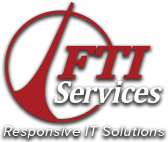Efficient IT Ticket Management - A Comprehensive Guide by an IT Firm in Woodland Hills
Woodland Hills, United States - March 6, 2025 / FTI Services - Woodland Hills Managed IT Services Company /
Woodland Hills IT Company Explains How to Streamline Support Ticket Handling
IT support tickets can accumulate rapidly in a business setting. As your business grows, the number of users in need of support increases too. If you don’t know how to handle IT support tickets efficiently, growing ticket volumes can quickly overwhelm your team members.
“Some think that quick response times to IT support tickets are enough, but a structured approach is needed to resolve issues faster and significantly boost customer satisfaction.” – Jason Cary, VP of Sales at FTI Services.
Adopting a streamlined support ticket system has clear benefits when it comes to operational efficiency. However, 53% of executives say that improving the customer experience is just as important as increasing efficiency at their business. The good news is that the right approach to IT support will help you accomplish both.
To help you reach that goal, and as the leading IT company in Woodland Hills, we have compiled our top tips for managing IT support tickets. We’ll cover essential tactics and strategies you can pass on to your support agents.
How to Answer Support Tickets
Providing clear, precise, and actionable responses to support requests is critical to customer service. Begin by acknowledging the customer’s issue promptly, which sets a positive tone and reassures the customer that their issue is being addressed.
Use this format for responses.
Summarize the issue
Provide a step-by-step solution
Suggest preventive measures if applicable
This response format builds trust and ensures that no detail is missed. Personalizing responses by using the customer’s name and referring to previous interactions can also make the interaction more engaging. Plus, it’s a good idea to follow up with customers after resolving their issues to confirm their satisfaction.
What Are Some of the Most Common Trouble Tickets in IT Support?
Understanding common types of IT support tickets helps prepare teams to handle them more efficiently. Building an easy-to-use knowledge base of common issues and their resolutions can help your service desk solve more issues in less time. CloudSecureTech notes that 82% of customers expect a first call resolution and a knowledge base can help you get there.
Here is an overview of some examples of common support cases.
| Common IT Support Tickets | Strategies for Resolution |
| Login and password resets | Create a password management system and provide user training. |
| Software installation and updates | Automate software deployment and updates, and maintain an updated software catalog. |
| Network connectivity problems | Regularly monitor network performance, and provide quick troubleshooting guides. |
| Hardware malfunctions | Maintain a log of hardware lifecycles and ensure timely replacements and service checks. |
| Security incidents | Implement robust cybersecurity protocols and provide regular security training. |
How to Track Support Tickets
Effective ticket tracking is crucial for timely resolution. Plus, most support teams measure their performance by customer satisfaction survey results and the number of resolved tickets. That makes a well-implemented ticket management system all the more important.
Good ticket management tools should do the following.
Track each ticket’s status
Assign tickets to appropriate personnel
Log resolution times
Monitor customer feedback
Integrating your ticketing system with other business applications can provide a unified view of IT operations. For example, linking the ticketing system with CRM software helps track how IT issues impact customer interactions. Regular analysis of ticket data also improves support processes and enables the implementation of preventive measures.
How to Categorize Support Tickets
Categorizing support tickets helps identify patterns and recurring issues. It’s also needed to ensure the customer support team knows which tickets need to be addressed first. Additionally, categorizing tickets enables more efficient resource allocation.
Effective categories you may use at your business include the following.
Priority: High, Medium, Low
Type: Hardware, Software, Network, Security
Department: Sales, HR, Finance, IT
Regularly review and update these categories based on emerging trends and new challenges. For instance, the increase in remote work has led to more network-related issues. Therefore, a type category of “Network” may need to be split further.
How to Prioritize Support Tickets
Prioritizing support tickets based on their impact on business operations is essential for managing workload effectively. Issues affecting critical business applications or many users should be prioritized over minor inconveniences. Also, if your business provides faster response times for a premium price, users who pay the rate should take priority over those who do not.
Using a formal priority matrix based on this criteria can streamline the prioritization process. Here’s an example of what that might look like.
| Priority Level | Criteria | Examples | Response Time |
| Critical |
|
| Immediate (within 1 hour) |
| High |
|
| Within 4 hours |
| Medium |
|
| Within 1 business day |
| Low |
|
| Within 3 business days |
*Please note that this is an example matrix for demonstration purposes. It is not a reflection of FTI Services’ actual SLA.
Implementing service level agreements (SLAs) establishes clear expectations for response and resolution times based on ticket priority. This structured approach improves response times and accountability within the IT support team.
How to Reduce Invalid Technical Support Tickets
Invalid support tickets can overwhelm your system and divert resources from genuine issues. Educate users on how to submit valid tickets and provide a self-service knowledge base. Providing this option can also have a positive side effect on customer satisfaction since 67% of users prefer self-service over speaking to a live agent.
Try these tips to reduce the volume of invalid tickets your team receives.
Conduct training on the importance of detailed ticket submission
Create a comprehensive FAQ section on common issues
Offer clear guidelines and templates for ticket submission
Implement automated ticket validation systems to filter incomplete submissions
By addressing the causes of invalid tickets, businesses can significantly improve the efficiency of their support operations. Engaging with users to gather feedback on the ticketing process provides valuable insights for improvement.
How an IT Company in Woodland Hills Can Help You Eliminate Support Tickets?
An increase in ticket volume that correlates with an increase in users may be inevitable, but that doesn’t mean you have to let it get out of hand. No matter the size of your business, there are still plenty of ways to lower the number of tickets that get submitted.
Proactive IT support, regular system maintenance, and user training programs are effective strategies. The better your IT systems function, the less likely a user is to experience an issue that necessitates a support ticket.
Engaging a managed IT service provider offers insights from industry experts on preemptive measures and best practices. FTI Services can offer guidance to help your team prevent a massive influx of support requests. We can also provide an additional set of hands to help your team handle an increasing ticket volume.
Reach out to a premier Woodland Hills IT company today to find out more.

Contact Information:
FTI Services - Woodland Hills Managed IT Services Company
6320 Canoga Ave 15th floor, Suite #1240
Woodland Hills, CA 91367
United States
FTI Woodland Hills
(805) 865-7366
https://www.ftiservices.com/
Original Source: https://www.ftiservices.com/how-to-handle-it-support-tickets/

